If you’ve ever owned a dog or walked one in your neighborhood, you’ve probably seen dog poop in various colors and consistencies.
While brown is the most common color, you may have also come across white dog poop, which can be quite puzzling.
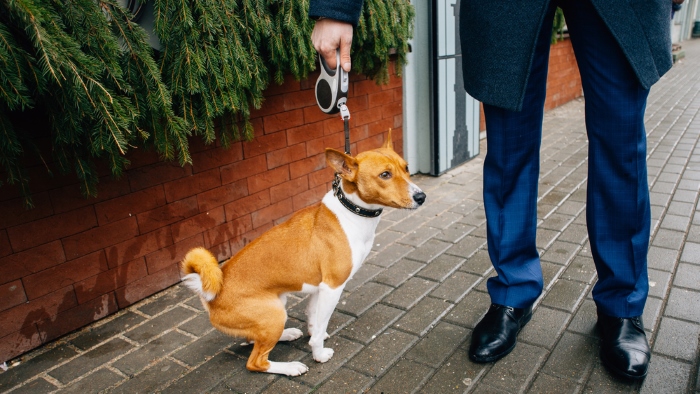
Many people believe that white dog poop is dangerous or a sign of illness in dogs.
In this blog, we’ll explore the truth behind this common misconception and shed light on what white dog poop really signifies.
Contents
The Causes of White Dog Poop
White dog poop can have different textures and shades, from hard and chalky to soft and powdery.
The appearance of white dog poop can give you some clues about the underlying cause.
Here are some of the most common causes of white dog poop and how to address them:
High-Calcium Diet
One of the most common reasons for white dog poop is a high-calcium diet.
This can happen if you feed your dog a raw diet that contains too many bones or eggshells or if you supplement their food with calcium without consulting a veterinarian.

Too much calcium can make your dog’s poop hard, crumbly, white, or very light in color[1].
It can also cause constipation, kidney stones, and other health issues.
The solution:
If you suspect that your dog’s diet is too high in calcium, you should switch to commercially formulated cooked dog food or consult a veterinary nutritionist for help balancing your dog’s diet.
You should also avoid giving your dog bones or eggshells as treats or snacks.
Medication Side Effects
Your dog’s feces may temporarily change color as a result of some drugs or treatments prescribed by your veterinarian.
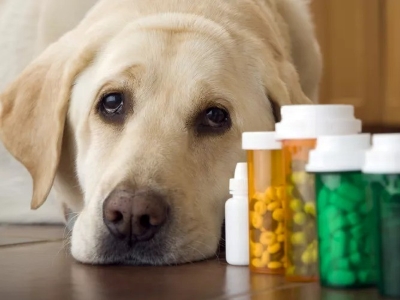
For instance, liquid barium, which is utilized in X-rays and other diagnostic procedures, might cause your dog’s feces to turn white or gray for a few days until it is eliminated from their system[2].
Antibiotics, antacids, anti-inflammatories, and dewormers are other drugs that can change the color of your dog’s feces.
The solution:
Consult your vet to find out whether and for how long any medications or recent medical procedures your dog is taking may influence the color of their feces.
Additionally, keep an eye out for any symptoms of difficulties or bad reactions in your dog, such as vomiting, diarrhea, appetite loss, or lethargic behavior.
Liver or Gallbladder Problems
Another possible cause of white dog poop is a problem with your dog’s liver or gallbladder[3].
These organs are responsible for producing and secreting bile, which is a greenish-yellow fluid that helps digest fats and gives poop its brown color.
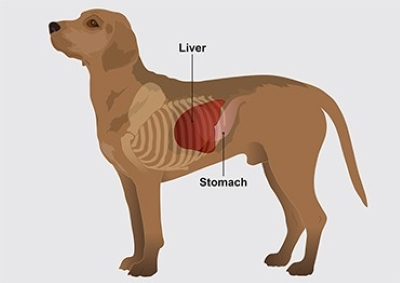
If there is not enough bile in your dog’s digestive tract, their poop may become pale or white.
This can happen if your dog has liver disease, gallstones, bile duct obstruction, or an infection.
The solution:
Take your dog to the doctor as soon as you can if you notice that their feces are frequently white or very pale in color.
To identify the issue’s root cause and choose the best course of action, your veterinarian may order blood tests, urine tests, ultrasounds, X-rays, or other diagnostic procedures.
Parasitic Infection
Another potential cause of white dog poop is a parasitic infection.
Some parasites that can infect dogs include tapeworms, roundworms, hookworms, whipworms, and giardia[4].
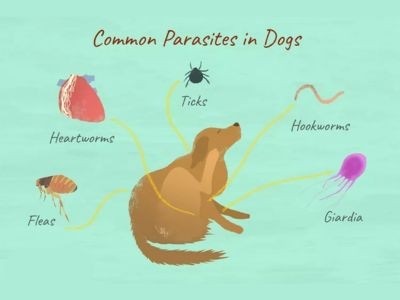
These parasites can interfere with your dog’s digestion and absorption of nutrients, causing malnutrition, weight loss, diarrhea, vomiting, and anemia.
Some parasites can also shed eggs or segments in your dog’s feces, which may appear as white specks or grains of rice.
The solution:
If you suspect that your dog has parasites, you should collect a fresh stool sample and take it to your veterinarian for analysis.
Your veterinarian will identify the type of parasite and prescribe the appropriate dewormer or anti–parasitic medication.
You should also follow good hygiene practices to prevent reinfection or transmission to other pets or humans.
Is White Dog Poop Dangerous?
Now that we understand what can cause white dog poop, let’s address the pressing question: is it dangerous?
In most cases, white dog poop is not inherently dangerous.
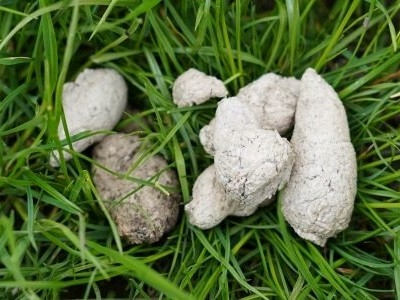
It is usually a temporary condition caused by dietary factors or minor disruptions in the digestive system.
However, if you notice persistent changes in your dog’s stool color, especially along with other concerning symptoms like diarrhea, vomiting, or lethargy, it’s essential to consult your veterinarian[5].
These symptoms might indicate an underlying health issue that needs attention.
What Does Healthy Dog Poop Look Like?
Healthy dog poop typically has a firm, moist consistency and is shaped like a log.
It should be brown in color, though shades can vary depending on the dog’s diet.
A slight odor is normal, but it shouldn’t be excessively foul.
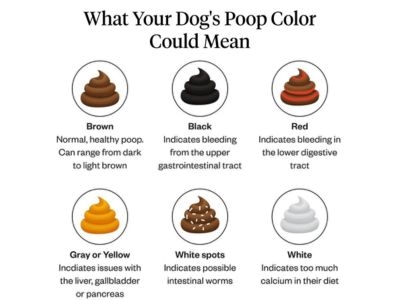
The presence of mucus or blood, as well as diarrhea, constipation, or any drastic changes in color or texture, can indicate underlying health issues and should be promptly addressed by a veterinarian.
Regular monitoring of your dog’s poop can provide insights into their digestive health, making it easier to detect potential problems early on.
Remember that diet, age, and individual variations can influence poop appearance, so it’s important to know what’s normal for your specific dog.
How to Prevent White Dog Poop
White dog poop can be a sign of an issue with the dog’s diet or health. To prevent white dog poop, follow these steps:
- Provide a Balanced Diet: Ensure your dog is eating a well-balanced diet that meets their nutritional needs.
High-quality commercial dog food or a balanced homemade diet can help provide the necessary nutrients for proper digestion.
- Avoid Excessive Bones: Feeding your dog too many bones, especially cooked bones, can lead to white or chalky stools.
While bones can be a part of a healthy diet, they should be given in moderation and always supervised.
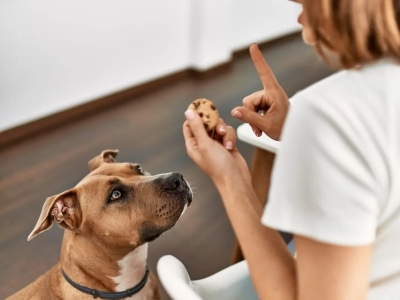
- Hydration: Ensure that your dog always has access to clean water.
Stool consistency and digestion might be impacted by dehydration.
- Regular Vet Checkups: Schedule regular checkups with your veterinarian.
They can monitor your dog’s overall health, provide dietary recommendations, and detect any underlying health issues that may affect stool quality.
- Monitor for Digestive Issues: Keep an eye on your dog’s poop.
If you notice persistent white stools, diarrhea, constipation, or any other unusual changes in stool color or consistency, consult your vet promptly.
- Avoid Consuming Spoiled or Contaminated Food: Ensure that the food you provide your dog is fresh and free of any toxins that might disrupt their digestive system.
When to See a Veterinarian
White dog poop is not a common occurrence in healthy dogs, so any consistent change in stool color or texture should be investigated by a veterinarian to determine the underlying cause and take appropriate action.
Also, You should see a veterinarian if:
- Your dog’s poop is consistently white or very light in color

- Your dog also displays additional signs, including vomiting, diarrhea, appetite loss, weight loss, lethargic behavior, or stomach pain.
- Your dog has been exposed to poisonous substances or strange items that might choke him or impede his breathing.
- Your dog has not been dewormed or vaccinated regularly
- You are unsure about the cause of your dog’s white poop or how to treat it
FAQs
Why is my dog’s poop sometimes white?
White dog poop can occur for various reasons, but the most common one is dietary. If your dog consumes items like bones, rawhide, or other chalky substances, it can lead to temporary changes in stool color.
Can certain medications cause white dog poop?
Yes, some medications, especially antacids and certain antibiotics, can affect the color of a dog’s stool, making it lighter or whiter. If you suspect medication is the cause, consult your vet for guidance.
Are there any serious health conditions associated with white dog poop?
While white dog poop is usually benign, it can be associated with underlying health conditions like liver or gallbladder issues. If you notice persistent changes in stool color along with other concerning symptoms, consult your veterinarian for a proper diagnosis.
Can I treat white dog poop at home?
Generally, there’s no need for home treatment for white dog poop unless it persists or is accompanied by other worrying symptoms. Consult your veterinarian for proper guidance and treatment, if necessary.
Is white dog poop more common in puppies or older dogs?
White dog poop can occur in dogs of all ages, but puppies and younger dogs are more likely to ingest non-food items and explore their surroundings with their mouths, increasing the chances of encountering substances that affect stool color.
Conclusion
White dog poop may look alarming, but in most cases, it is not dangerous.
It often results from dietary factors, the consumption of foreign objects, or minor digestive disruptions.
However, it’s crucial to pay attention to any persistent changes in your dog’s stool color, especially when accompanied by other concerning symptoms.
Regular vet check-ups and a well-balanced diet can go a long way toward ensuring your furry friend’s digestive health.
If in doubt, always consult with your veterinarian for professional guidance on your dog’s specific needs.
Remember, a healthy diet and responsible pet care are the keys to keeping your dog’s digestive system in tip-top shape.
Reference:
- Hypercalcemia | VCA Animal hospitals
- Side effects of pet medications | PetMD
- Liver disease in dogs: causes, symptoms, stages, and more | ASPCA
- How to get rid of fleas on dogs? The ultimate solution | DogLikesBest
- All about dog poop: dog diarrhoea, colour, and more | Purina

Dania is a dog groomer living in California, who loves styling dogs. She often uses dog accessories to keep them distracted while grooming. She is also a dog parent to a Pomeranian, Duke. It’s because of him she is always on a lookout for the best dog foods, toys, other dog accessories, and ways to keep him equipped, healthy and happy.


